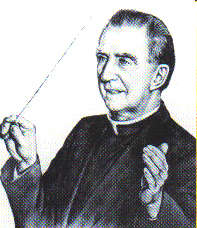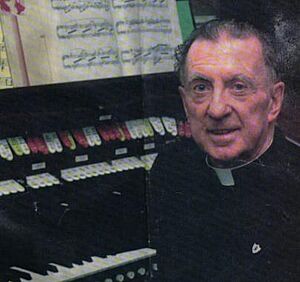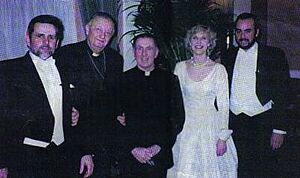John O'Brien (priest) facts for kids
Quick facts for kids
|
|
|---|---|
| Born | 30 May 1931 Kilrush, County Clare, Ireland
|
| Died | 6 January 2008 (aged 76) Finglas, Dublin, Ireland
|
| Alma mater | Clonliffe College |
| Occupation | Roman Catholic priest |
John O'Brien (born May 30, 1931 – died January 6, 2008) was a Roman Catholic priest in Dublin, Ireland. He worked for the Archdiocese of Dublin from 1956 until he passed away. Many people remember him as one of Ireland's best conductors and a skilled organist. He also founded two important music groups: the St. James' Choir and the Glasnevin Musical Society.
Contents
Life and Work
Early Years
John O'Brien was born in Kilrush, County Clare, Ireland, on May 30, 1931. He was the oldest of four children. His father, Michael O'Brien, owned a pub, and his mother was Mary O'Dea.
John loved music from a young age. His mother played the violin, and the family's housekeeper sang to the children every night. When he was seven, John started piano lessons with Mrs. Atherton. He was a very good student. Soon, he was good enough to play a solo at the St. Patrick's Day concert in Kilrush.
Becoming a Priest
John O'Brien went to the Christian Brothers' school in Kilrush. At sixteen, he entered a junior seminary in Ennis to study to become a priest. After finishing his studies, he was chosen to join the Archdiocese of Dublin.
He began his training at Clonliffe College in September 1949. On May 25, 1956, Archbishop John Charles McQuaid ordained him as a priest.
John O'Brien's first job was as a chaplain at St. Michael's Hospital, Dun Laoghaire. In 1957, he became a curate in Glasnevin Parish. He also served as the first official chaplain for the Bon Secours Hospital. In 1962, he moved to Ballitore in County Kildare. Later, in 1966, he moved to St. James's, one of Dublin's oldest parishes. In 1975, he went to St. Andrew's, Westland Row. Finally, in 1983, he became the parish priest of St. Canice's in Finglas. He retired in 1996 but continued to live in Finglas.
Musical Journey
John O'Brien had a deep passion for music throughout his life. He used his musical talents to bring joy to many people.
Starting the Glasnevin Musical Society
In 1955, John was asked to conduct a musical show called The New Moon in Kilrush. The original conductor was sick, so John stepped in. He was a bit nervous because a famous singer, Thomas Round, was in the cast.
While at Clonliffe College, John learned from Fathers Sean Quigley and Brendan Lawless. He was confident enough to start a choir with the nurses at St. Michael's Hospital. When he moved to Glasnevin, he made the church choir even better. With the support of his parish priest, Michael Geraghty, John founded the Glasnevin Musical Society in 1958.
Their first big show was The Desert Song in Dublin. It was a huge success! This led to another show, The Student Prince, in 1959. In 1960, the Glasnevin Musical Society performed an opera called The Lily of Killarney at the Olympia Theatre. Famous singers like Veronica Dunne were part of the cast.
Leading the St. James' Choir
When John was at St. James's Parish, he made the church choir much bigger. He also helped fix the church organ. The choir, now known as the St. James's Choir, began performing in public. Their first major event was a TV show on RTÉ in 1971. They performed Gounod's St. Cecilia Mass.
In 1972, the choir performed Antonín Dvořák's Requiem Mass. This performance was a big moment for the choir. It led to RTÉ inviting them to perform Haydn's The Creation with the RTÉ Concert Orchestra.
The St. James's Choir traveled to North America three times (1973, 1975, 1978). They performed Irish and sacred music in cities like New York and Toronto. In 1989, they visited San Francisco. They also went to Lourdes several times, giving special concerts at the Shrine.
Starting in 1984, John O'Brien began an annual series of "Christmas Music" concerts in Dublin's National Concert Hall. These concerts were so popular that they added a second performance each year from 1988.
Even though a new choir, the RTÉ Philharmonic Choir, started in 1984, John continued to direct his own concerts. He conducted many famous works, including Verdi's Requiem (1987) and Handel's Messiah (1990).
Later Life and Passing
John O'Brien faced health challenges throughout his life. He had pneumonia as a child. While studying to be a priest, he spent several Christmases in the hospital. Later in life, he had heart attacks and strokes, which made it hard for him to conduct large musical shows. His health also led him to retire from his active duties as a priest in 1996.
On January 6, 2008, after attending a mass at St. Canice's Church in Finglas, John O'Brien returned home. He passed away peacefully at the age of 76.




